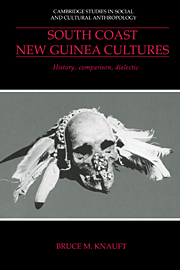Book contents
- Frontmatter
- Contents
- List of figures
- List of tables
- Acknowledgments
- 1 Language-culture areas of south coast New Guinea
- Part 1 Grounding
- Part 2 Critique
- Part 3 Reconfiguration
- 7 Theoretical reconfiguration
- 8 Marind-anim
- 9 Symbolic and sociopolitical permutations
- 10 Regional characteristics and comparisons
- Appendix: evidence concerning Asmat homosexuality
- Notes
- List of references
- Index
- Cambridge Studies in Social and Cultural Anthropology
7 - Theoretical reconfiguration
from Part 3 - Reconfiguration
Published online by Cambridge University Press: 04 December 2009
- Frontmatter
- Contents
- List of figures
- List of tables
- Acknowledgments
- 1 Language-culture areas of south coast New Guinea
- Part 1 Grounding
- Part 2 Critique
- Part 3 Reconfiguration
- 7 Theoretical reconfiguration
- 8 Marind-anim
- 9 Symbolic and sociopolitical permutations
- 10 Regional characteristics and comparisons
- Appendix: evidence concerning Asmat homosexuality
- Notes
- List of references
- Index
- Cambridge Studies in Social and Cultural Anthropology
Summary
What are the goals of comparative analysis, indeed, of ethnographic analysis in general? What is its purpose and justification? Anthropologists are increasingly cognizant that they are unlikely to predict future sociocultural developments with precision or exert great impact upon their general course of future development. Our role, rather, is as rigorous commentators on the past and present. In this regard, our goal should be to use the tools of social science to further a humanistic perspective as much as the other way around. This agenda does not mean that anthropology is unscientific. Rather, it suggests that we embrace science in the wider sense of rigorous and systematic knowledge – in some ways reflected in the notion of science as wissenschaft – and that we take the type and end of knowledge, its human and pragmatic justification, to be important.
In studying social life, objectivism should be a tool rather than an end in itself. Indeed, it is just when objectivism is assumed to be a neutral or transparent window upon social reality that its assumptions go most unquestioned and are most in danger of being fulfilled as tautologies. Analysis can take on the guise of an unbiased if not arbitrary search for knowledge while in fact being subservient to unexamined cultural biases that are actualized through the status competition of Western scholarly discourse (Bourdieu 1988a, 1990c; see anthropological case examples in Kuper 1988; Stocking 1987).
- Type
- Chapter
- Information
- South Coast New Guinea CulturesHistory, Comparison, Dialectic, pp. 129 - 135Publisher: Cambridge University PressPrint publication year: 1993

